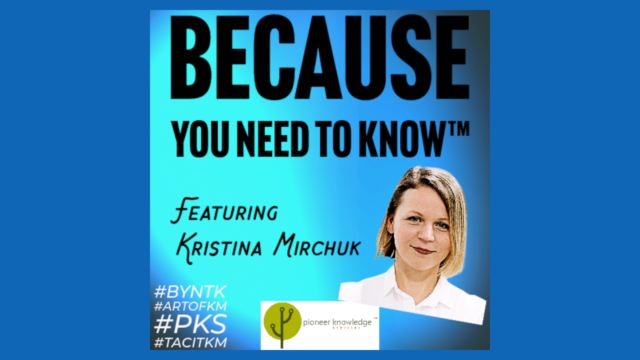
What are “knowledge pills” and how useful could they be?
The use of “knowledge pills” is a relatively recent and emerging knowledge transfer phenomena, for example as illustrated by their use in an EU-funded project and by the International Federation of Fertility Societies.
But what are “knowledge pills” exactly? And how useful could they be? A paper1 presented at the recent 23rd European Conference on Knowledge Management (ECKM 2022) has set out to start to answer these questions.
The paper authors carried out a narrative literature review to:
- clarify the definition, characteristics, and potential benefits of knowledge pills
- analyse their implications from a knowledge management (KM) perspective
- explore potential problems and risks.
The authors don’t specifically state why they carried out a narrative review rather than a systematic review. However, it’s apparent from other comments they make that a systematic review would have been impossible due to a significant lack of published academic research. They advise that a rapid search of the Scopus academic database using the term “knowledge pills” yielded less than ten references. In contrast, a general Google search carried out on the same day produced more than 10,000 results. The authors say that this seems to indicate that the topic of knowledge pills raises much more interest among practitioners than academics. They also advise that it means more research is needed in regard to knowledge pills and their application.
What are “knowledge pills”?
The paper authors explore various definitions of “knowledge pills” from the reviewed literature, and also provide their own description which aligns with those definitions:
Knowledge pills (KPs) are a technique for transferring knowledge through short factual batches of content. In education and vocational training, they can help learners acquire specific pieces of knowledge in a few minutes, through a “microteaching” approach where learners can be involved in active and interactive exercises, quizzes, and games.
Just as someone might take a pill to provide direct and immediate relief from the symptoms of a medical condition, knowledge pills are small packaged doses of knowledge designed to address a direct or immediate need. The paper authors advise that this means they are well-suited to vocational training and competency development.
Drawing on the reviewed literature, the paper authors also identify the main categories of knowledge pills, the aims for their use, and their potential advantages.
The three main categories of knowledge pills are:
- concept learning pills, pertaining to the knowledge of concepts, classifications, definitions, theories, description of phenomena, and so on
- exercise learning pills, which can be used to acquire competences or skills that may involve both problem solving and practical activities, where learners are invited to apply pieces of knowledge acquired elsewhere (or in another part of a course)
- testing knowledge pills, that can be used to evaluate the level of knowledge of training participants.
Aims for the use of knowledge pills can be to:
- favour conceptual enrichment, being the comprehension and assimilation of the specific contents of a subject
- implement procedural development, for instance, to learn the steps to perform a specific action or operation
- facilitate attitudinal changes and the development of social or personal skills.
The potential advantages of knowledge pills include:
- the possibility to be used independently from one another or easily connected in a series
- their content is easy to remember, and they can easily adapt to the learning level
- simpler and faster learning than formal training sessions becomes possible
- flexibility in use on various platforms, with various teaching methods, and for different expected outcomes.
Thanks to advances in multimedia technology, knowledge pills can contain a mix of content, such as audio, images, and videos. The most common form is a short video, presented in an attractive way, for example, an instructional presentation showing how to perform various activities within a particular job. The use of an online e-learning platform or similar is recommended for the delivery of knowledge pills. Such platforms have the advantage of being able to convey knowledge in a fast and accessible way to almost all devices with an internet connection.
I caution though that the term “knowledge pills” has a faddish buzzword2 ring to it, and indeed, people in the KM community have already been facilitating training that fits the description of “knowledge pills” but not with that name. For example, Kelly Barrett’s SHOTs microlearning program at the U.S. Internal Revenue Service (IRS). Further, while multimedia formats and online delivery are relatively recent developments, short packaged “knowledge pill” style education and training activities have possibly been used with different names and delivery mediums for quite some time. These issues mean that there is potentially a wider body of relevant research and practice literature than that reviewed by the paper authors, indicating the need for further research and analysis.
Potential benefits for knowledge management
The paper authors advise that knowledge pills can be used to facilitate knowledge management (KM) in organisations. Knowledge pills can support knowledge identification and knowledge sharing, making them a useful tool for organisations to fill knowledge gaps or update obsolete knowledge. Further, the paper authors state that knowledge pills can:
- facilitate the acquisition or consolidation of professional know-how and can enable the design of training tailored to the knowledge needs that are specific to a duty
- transform each employee into a training agent inside the organisation, because she/he can easily transmit knowledge by creating a knowledge pill
- consolidate the knowledge already existing in the organisation, by creating a form of organizational memory
- avoid the permanent repetition of informal training processes and reduce the costs of traditional training
- easily enable the training not only of internal employees but also customers and partners.
Potential problems and risks
Finally, the paper authors identify potential problems and risks in the use of knowledge pills:
- proper methods and technologies must be adopted to easily define and implement knowledge pills, and teachers and learners must be aware of how to get the most out of them
- a careful selection of content to be delivered is necessary, keeping in mind that knowledge pills are a fast-learning technique
- a proper methodology has to be used in the design and creation of knowledge pills, to allow the activation of personal learning processes by learners and their increased interest and motivation
- special expertise by teachers and instructors that are willing to use this method must be developed, which can raise the cost of their adoption
- as there are different categories of, and aims for, knowledge pills, there is a need for instructors to choose the proper format in accordance with the specific pedagogical needs and the KM processes which the knowledge pills are aimed to activate and facilitate
- knowledge pills may require some sort of maintenance to keep them updated.
Header image source: Wes Hicks on Unsplash.
References:
- Bolisani, E., Scarso, E., Zieba, M., Durst, S., Zbuchea, A., Lis, A. M., & Kassaneh, T. C. (2022). Knowledge pills in Education and Training: A Literature Review. Proceedings of the 23rd European Conference on Knowledge Management, 89-96. ↩
- Miller, D., & Hartwick, J. (2002). Spotting management fads. Harvard Business Review, 80(10), 26-7. ↩
Also published on Medium.






